Letter from Arthur Seaforth Blackburn to his family, 1941-Part 1 of 3
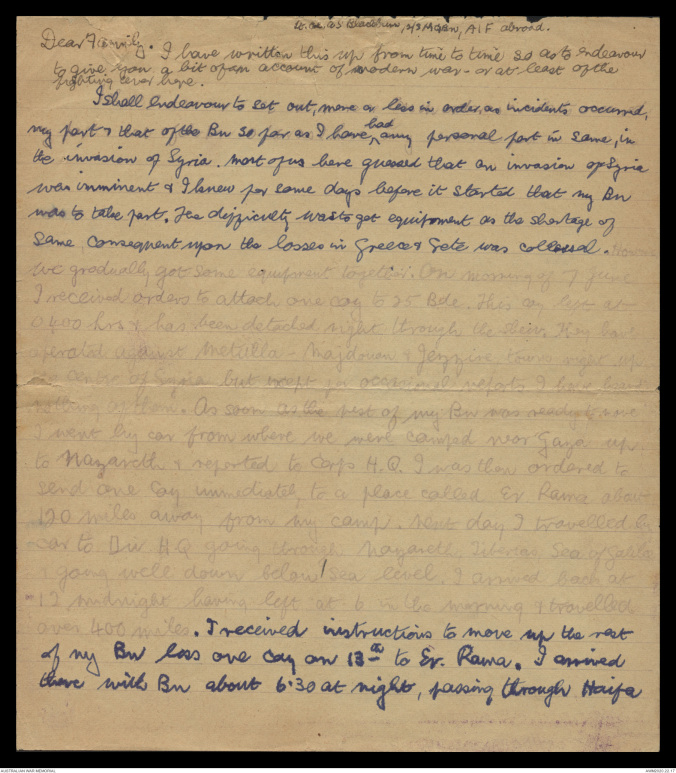
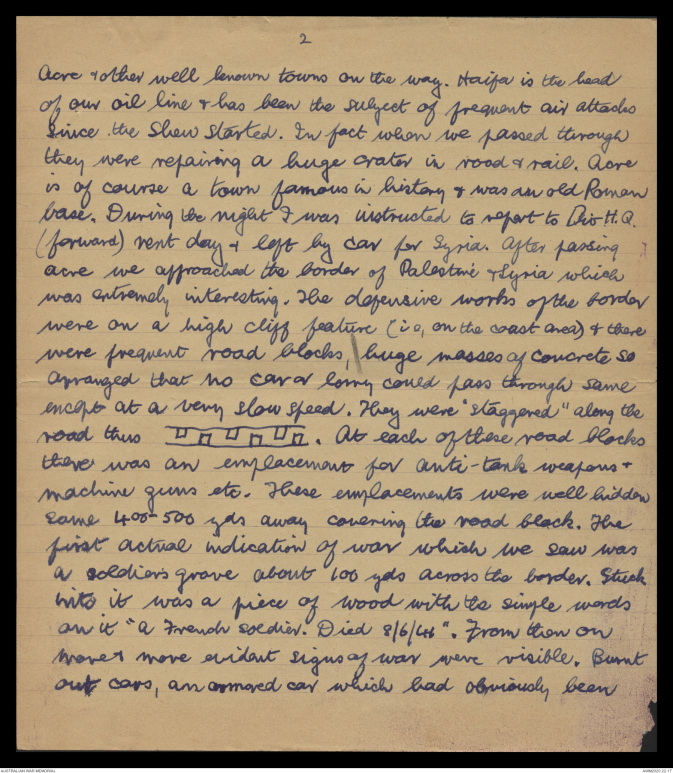
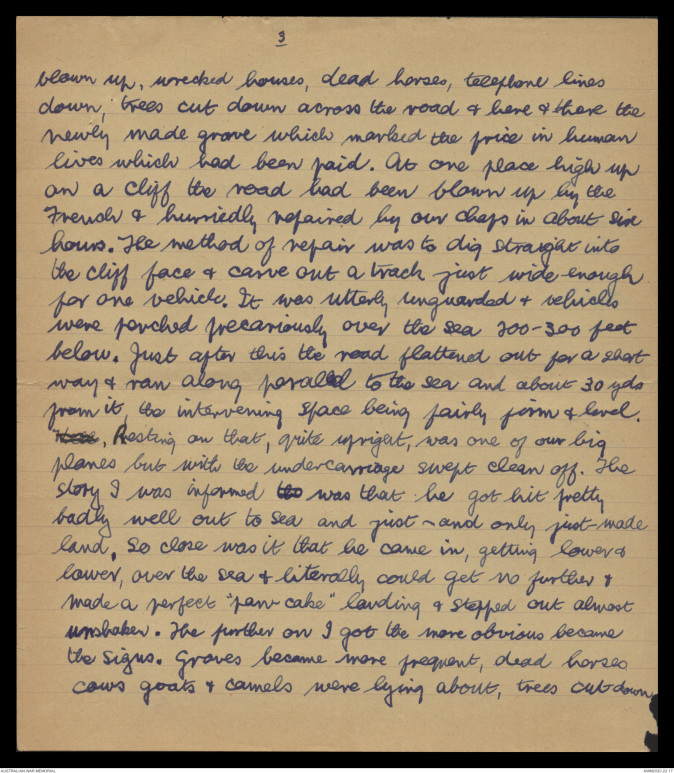
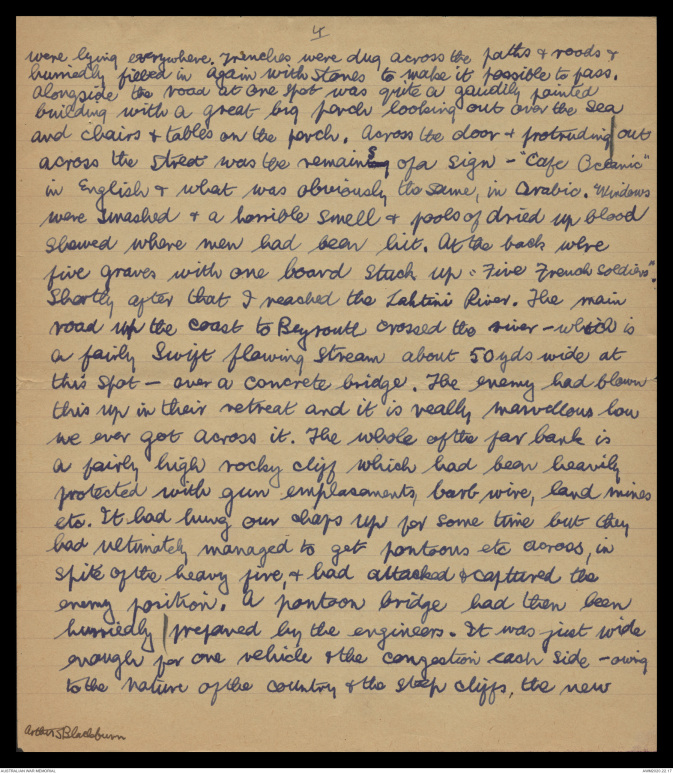
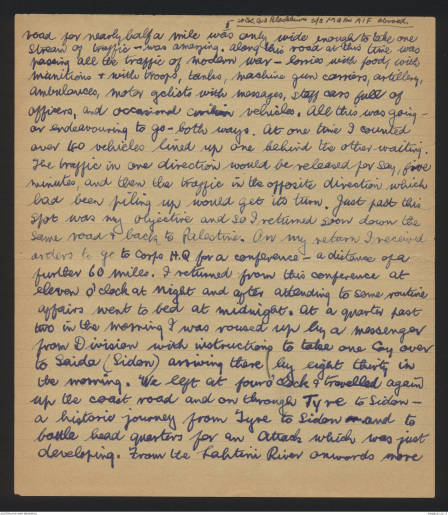
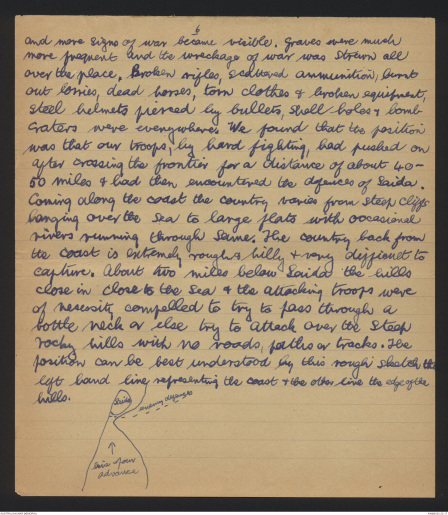
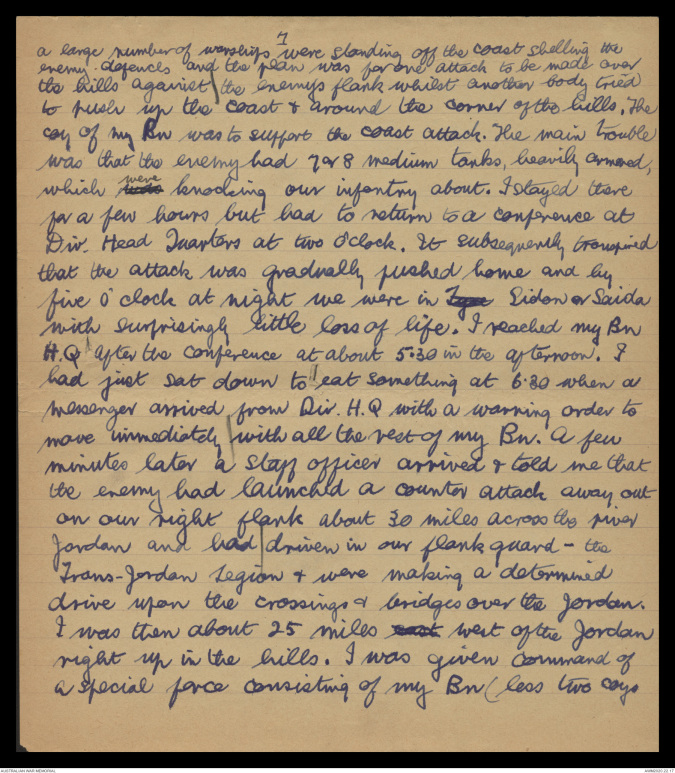
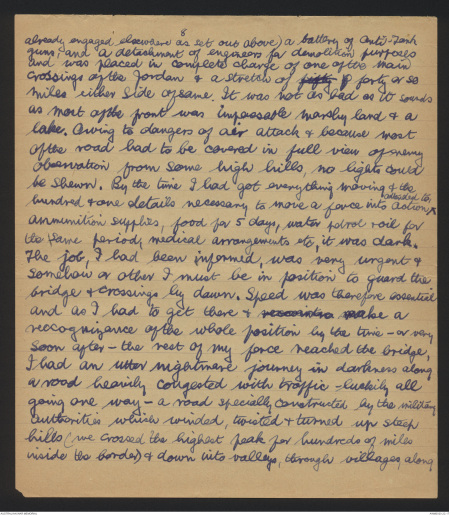
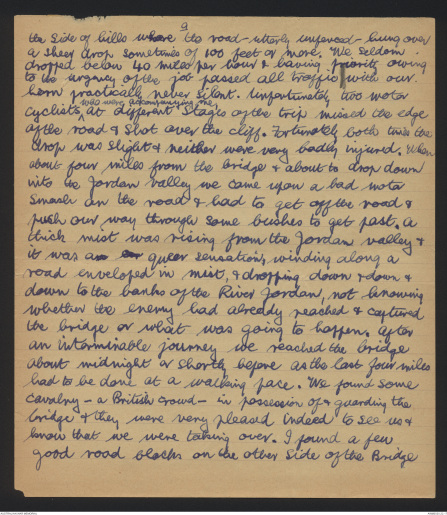
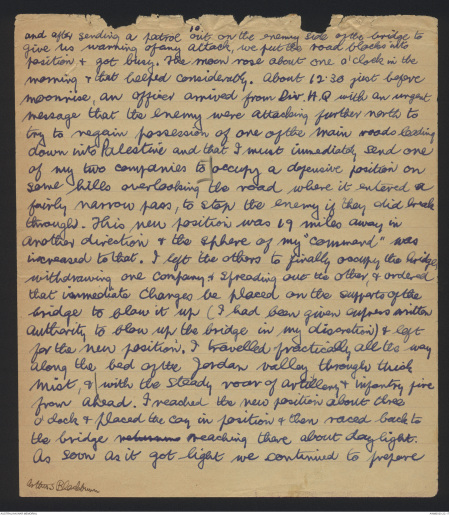
Lt. Col, A S Blackburn, 2/3 MG BN, AIF abroad.
Dear Family
I have written this up from time to time so as to endeavour
to give you a bit of an account of modern war - or as least of the
fighting over here.
I shall endeavour to set out, more or less in order, as incidents occurred,
my part & that of the Bn so far as I have had any personal part in same, in
the invasion of Syria. Most of us here guessed that an invasion of Syria
was imminent & I knew for some days before it started that my Bn
was to take part. The difficulty was to get equipment as the shortage of
same consequent upon the losses in Greece & Crete was collossal. However
we gradually got some equipment together. On morning of 7 June
I received orders to attach one coy to 25 Bde. This coy left at
0400 hrs & has been detached right through the show. They have
operated against Metulla - Majdorian & Jezzine towns right up
the centre of Syria but except for occasional reports I have heard
nothing of them. As soon as the rest of my Bn was ready to move
I went by car from where we were camped near Gaza up
to Nazareth & reported to Corp H.Q. I was then ordered to
send one coy immediately to a place called Er Rama about
120 miles away from my camp. next day I travelled by
car to Div H.Q going through Nazareth, Tiberias, Sea of Galilee
going well down below sea level. I arrived back at
12 midnight, having left at 6 in the morning & travelled
over 400 miles. I received instructions to move up the rest
of my Bn less one coy on 13th to Er Rama. I arrived
there with Bn about 6.30 at night, passing through Haifa
2
Acre & other well known towns on the way. Haifa is the head
of our oil line & has been the subject of frequent air attacks
since the show started. In fact when we passed through
they were repairing a huge crater in road & rail. Acre
is of course a town famous in history & was an old Roman
base. During the night I was instructed to report to Div H.Q.
(forward) next day & left by car for Syria. After passing
acre we approached the border of Palestine & Syria which
was extremely interesting. The defensive works of the border
were on a high cliff feature (ie, on the coast area) & there
were frequent road blocks, huge masses of concrete so
arranged that no car or lorry could pass through same
except at a very slow speed. They were "staggered" along the
road thus. At each of these road blocks
there was an emplacement for anti-tank weapons &
machine guns etc. These emplacements were well hidden
some 400-500 yds away covering the road block. The
first actual indication of war which we saw was
a soldier's grave about 100 yds across the border. Stuck
into it was a piece of wood with the simple words
on it "a French soldier. Died 8/6/41". From then on
more & more evident signs of war were visible. Burnt
out cars, an armored car which had obviously been
3
blown up, wrecked houses, dead horses, telephone lines
down, trees cut down across the road & here and there the
newly made grave which marked the price in human
lives which had been paid. At one place high up
on a cliff the road had been blown up by the
French & hurriedly repaired by our chaps in about six
hours. The method of repair was to dig straight into
the cliff face & carve out a track just wide enough
for one vehicle. It was utterly unguarded & vehicles
were perched precariously over the sea 200-300 feet
below. Just after this the road flattened out for a short
way & ran along parallel to the sea and about 30 yds
from it the intervening space being fairly firm & level. Well, Resting on that, quite upright, was one of our big
planes but with the undercarriage swept clean off. The
story I was informed tho was that he got hit pretty
badly well out to sea and just - and only just - made
land. So close was it that he came in, getting lower &
lower, over the sea & literally could get no further &
made a perfect "pan cake" landing & stepped out almost
unshaken. The further on I got the more obvious became
the signs. Graves became more frequent, dead horses,
cows goats & camels were lying about, trees cut down
4
were lying everywhere. Trenches were dug across the paths & roads &
humedly filled in again with stones to make it possible to pass.
Alongside the road at one spot was quite a gaudily painted
building with a great by porch looking out over the sea
and chairs & tables on the porch. Across the door & protruding out
across the street was the remainsing of a sign - "Cafe Oceanic"
in English & what was obviously the same, in Arabic. Windows
were smashed & a horrible smell & pools of dried up blood
showed where men had been hit. As the back were
five graves with one board stuck up. Five "French Soldiers".
Shortly after that I reached the Lahtini River. The main
road up the coast to Beyrouth crossed the river - which is
a fairly Swift flawing stream about 50yds wide at
this spot - over a concrete bridge. The enemy had blown
this up in their retreat and it is really marvellous how
we ever got across it. The whole of the far bank is
a fairly high rocky cliff which had been heavily
protected with gun emplacements barb wire, land mines
etc. It had hung our chaps up for some time but they
had ultimately managed to get pontoons etc across, in
spite of the heavy fire, & had attacked & captured the
enemy position. A pontoon bridge had then been
hurriedly prepared by the engineers. It was just wide
enough for one vehicle & the congestion each side -owing
to the nature of the country & the step cliffs, the new
Arthur S Blackburn
5 Lt Col A.S.Blackburn 2/3 M G Bn AIF abroad.
road for nearly half a mile was only wide enough to take one
stream of traffic - was amazing. Along this road at is time was
passing all the traffic of modern war - lorries with food, with
munitions & with troops, tanks, machine gun carriers, artillery,
ambulances, motor cyclists with messages, staff cars full of
officers, and occasional civilian vehicles. All this was going -
or endeavouring to go - both ways. At one time I counted
over 40 vehicles lined up one behind the other waiting.
The traffic in one direction would be released for say, five
minutes, and then the traffic in the opposite direction which
had been piling up would get its turn. Just past this
spot was my objective and so I returned soon down the
same road & back to Palestine. On my return I received
orders to go to Corps H.G for a conference - a distance of a
further 60 miles. I returned from this conference at
eleven o'clock at night and after attending to some routine
affairs went to bed at midnight. At a quarter past
two in the morning I was roused up by a messenger
from Division with instructions to take one Coy over
to Saida (Sidon) arriving there by eight thirty in
the morning. We left at four o'clock & travelled again
up the coast road and on through Tyre to Sidon -
a historic journey from Tyre to Sidon av and to
battle head quarters for an attack which was just
developing. From the Lahtini River onwards more
6
and more signs of war became visible. Graves were made
more frequent and the wreckage of war was strewn all
over the place. Broken rifles, scattered ammunition, burnt
out lorries, dead horses, torn clothes & broken equipment,
steel helmets pierced by bullets, shell holes & bomb
craters were everywhere. We found that the position
was that our troops, by hard fighting, had pushed on
after crossing the frontier for a distance of about 40 -
50 miles & ha then encountered the defences of Saida.
Coming along the coast the country varies from steep cliffs
hanging over the sea to large flats with occasional
rivers running through same. The country back from
the coast is extremely rough & hilly & very difficult to
capture. About two miles below Saida the hills
close in close to the sea & the attacking troops were
of necessity compelled to try to pass through a
bottle neck or else try to attack over the steep
rocky hills with no roads, paths or tracks. The
position can be best understood by this rough sketch the
left hand line representing the coast & the other line the edge of the
hills.
7
a large number of warships were standing off the coast shelling the
enemy defences and the plan was for one attack to be made over
the hills against the enemy's flank whilst another body tried
to push up the coast & around the corner of the hills. The
coy of my Bn was to support the coast attack. The main trouble
was that the enemy had 7 or8 medium tanks, heavily armed,
which was were knocking our infantry about. I stayed there
for a few hours but had to return to a conference at
Div. Head Quarters at two O'clock. It subsequently transpired
that the attack was gradually pushed home and by
five o'clock at night we were in Tyre Sidon or Saida
with surprisingly little loss of life. I reached my Bn
H.G after the conference at about 5.30 in the afternoon. I
had just sat down to eat something at 6.30 when a
messenger arrived, from Div. H.Q with a warning order to
move immediately with all the rest of my Bn. A few
minutes later a staff officer arrived & told me that
the enemy had launched a counter attach away out
on our right flank about 30 miles across the river
Jordan and had driven in our flank guard - the
Trans-Jordan Legion & were making a determined
drive upon the crossings & bridges over the Jordan.
I was then about 25 miles east west of the Jordan
right up in the bills. I was given command of
a special force consisting of my Bn (less two coys
8
already engaged elsewhere as set out above) a battery of Anti-Tank
guns, and a detachment of engineers for demolition purposes
and was placed in complete charge of one of the main
crossings of the Jordan & a stretch of fifty o forty or so
miles either side of same. It was not as bad as it sounds
as most of the front was impassable marshy land & a
lake. Owing to dangers of air attack & because most
of the road had to be covered in full view of enemy
observation from some high hills, no lights could
be shown. By the time I had got everything moving & the
hundred & one details necessary to move a force into action attended to,
ammunition supplies, for for 5 days, water petrol & oil for
the same period , medical arrangements etc, it was dark.
the job, I had been informed, was very urgent &
somehow or other I must be in position to guard the
bridge & crossings by dawn. Speed was therefore essential
and as I had to get there & recointra make a
reccognizance of the whole position by the time - or very
soon after - the rest of my force reached the bridge,
I had an utter nightmare journey in darkness along
a road heavily congested with traffic - luckily all
going one way - a road specially constructed by the military
authorities which winded, twisted & turned up steep
hills (we crossed the highest peak for hundreds of miles
inside the border) & down into valleys, through villages, along
9
the side of hills where the road - utterly unfenced - hung over
a sheer drop sometimes of 100 feet or more. We seldom
dropped below 40 miles per hour & having priority owing
to the urgency of the job passed all traffic with our
horn practically never silent. Unfortunately two motor
cyclists was were accompanying me, at different stages of the trip missed the edge
of the road & shot over the cliff. Fortunately both times the
drop was slight & neither were very badly injured. When
about four miles from the bridge & about to drop down
into the Jordan valley we came upon a bad motor
smash on the road & had to get off the road &
push our way through so me bushes to get past. A
thick mist was rising from the Jordan valley &
it was an eir queer sensation, winding along a
road enveloped in mist, & dropping down & down &
down to the banks of the River Jordan, not knowing
whether the enemy had already reached & captured
the bridge or what was going to happen. After
an interminable journey we reached the bridge
about midnight or shortly before as the last four miles
had to be done at a walking pace. We found some
cavalry - a British crowd - in possession of & guarding the
bridge & they were very pleased indeed to see us &
know that we were taking over. I found a few
good road blocks on the other side of the Bridge
10
and after sending a patrol out on the enemy side of the bridge to
give us warning of any attack, we put the road blocks into
position & got busy. The moon rose about one o'clock in the
morning & that helped considerably. About 12.30 just before
moonrise, an officer arrived from Div. H.Q with an urgent
message that the enemy were attacking further north to
try to regain possession of one of the main roads leading
down into Palestine and that I must immediately send one
of my two companies to occupy a defensive position on
some hills overlooking the road where it entered a
fairly narrow pass, to stop the enemy if they did break
through. This new position was 19 miles away in
another direction & the sphere of my "command" was
increased to that. I left the others to finally occupy the bridge,
withdrawing one company & spreading out the other, & ordered
that immediate charges be placed on the supports of the
bridge to blow it up (I had been given express written
authority to blow up the bridge in my discretion) & left
for the new position. I travelled practically all the way
along the bed of the Jordan valley through thick
mist, & with the steady roar of artillery & infantry fire
from ahead. I reached the new position about three
o'clock & placed the coy in position & then raced back to
the bridge returnin reaching there about daylight.
As soon as it got light we continued to prepare
Arthur S Blackburn
 Jacqueline Kennedy
Jacqueline KennedyThis transcription item is now locked to you for editing. To release the lock either Save your changes or Cancel.
This lock will be automatically released after 60 minutes of inactivity.